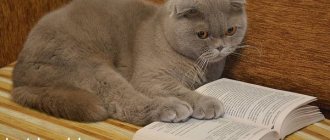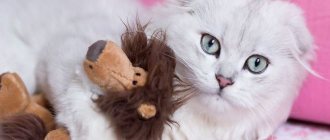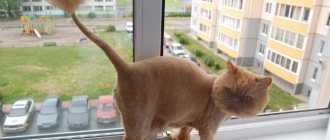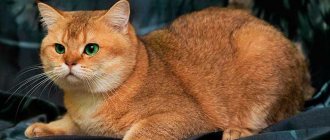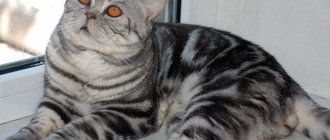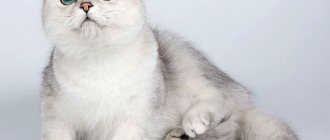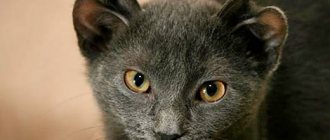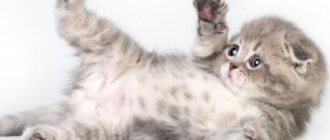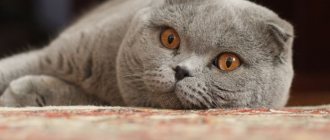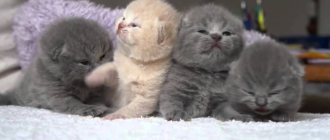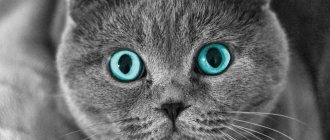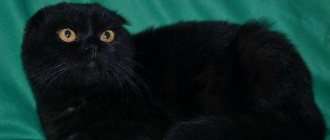Exterior Features
The body of the animal is medium to large in size, very muscular and squat. The cat has a wide, rather massive chest, shoulders and back; their neck is short and voluminous.
Scottish Folds are characterized by thick, round paws, a medium, thick and very mobile tail with a slightly rounded tip.
The head is round, wide, with a massive chin. The nose is also wide, short and straight. One of the main differences from other cats is their full cheeks with large whisker pads, which gives the face a recognizable appearance.
The ears are small, slightly curved forward and down, their tips are slightly rounded. They are set wide and pressed tightly to the head, which emphasizes its round shape.
The fur is short, very thick and not adjacent to the body. There is also a quite thick undercoat, which makes the coat as a whole very dense, “plush”.
All colors are accepted for these cats, including color point without white.
Disadvantages are considered to be rigidity in any part of the tail and spine, ears and feet positioned in profile from the skull.
The eyes are large, round, widely set. The color matches the coat.
Adults are about 30 centimeters tall at the withers and weigh from 4 to 10 kilograms.
Health and disease of the Scottish breed
Scottish Fold cats are considered to have fairly good health. However, the mutant gene still makes itself felt. Diseases of Scottish cats occur, mainly transmitted by inheritance.
The most common disease in Scottish Fold cats is osteochondrodystrophy. This disease is characterized by impaired development of cartilage and bone tissue. This leads to fusion of the vertebrae, incorrect positioning of the paws and improper formation of joints. All this causes pain to the animal, the pet moves little, and movements are constrained.
Due to the anatomical features of the ears, the Scottish Fold cat is susceptible to diseases of the auditory canal, such as:
- Otitis. Inflammation of the ear canal is most often a consequence of a bacterial infection. A predisposing factor is also insufficient or excessive ear hygiene.
- Tumors. A mutant gene can cause pathological cell division and the appearance of tumors.
- Otodectosis. A parasitic disease caused by the proliferation of ear mites. Causes severe itching in animals. If left untreated, it leads to otitis media, and in more advanced cases even to deafness.
- Deafness. It can act as a separate disease or as a consequence of advanced cases of the above diseases.
Scottish Fold cats are a brachycephalic breed. As is known, such animals are predisposed to eye diseases:
- Increased lacrimation. Perhaps your Scottish Fold cat's eyes are watery due to a blocked nasolacrimal duct.
- Turning of the eyelids. A common disease. Usually treated surgically.
- Eye injury. Mechanical eye damage is more common in brachycephalics.
Also, the Scottish Fold cat is predisposed to heart disease, polycystic kidney disease and metabolic diseases (ICD, diabetes mellitus).
To maintain the health of your Scottish pet, it is necessary to carry out preventive measures. Provide proper care for Scottish Fold kittens from childhood. It is mandatory to vaccinate Scottish Fold kittens according to their age. You need to make it a rule to conduct a medical examination once a year or at least once every 2 years. Undergo diagnostic tests, take tests, do an ultrasound. This will allow you not to miss hidden diseases and recognize them in the early stages.
Origin
In not so distant 1961, in Scotland, a white cat named Susie appeared on one of the local farms, distinguished from all the others by her unusual hanging ears.
A little later it turned out that the cause of this unusual “defect” was a spontaneous mutation, which pleased the friends of the owner of the estate.
Rumors about Susie reached a breeder named William Ross, who specialized in "British" breeds. William and his wife Mary were the first to breed "Scots" and created the Denisla kennel. In this simple way, a simple village cat became the ancestor of the now popular pets.
Advantages and disadvantages
Fold cats are favorites of famous personalities. They write books on them and run YouTube channels.
Advantages:
- High level of intelligence.
- Feel the mood of the owner.
- Clean.
- They do not show aggression or revenge.
- Kind and cheerful.
Disadvantages of the breed:
- They do not tolerate loneliness well.
- Raising an obedient cat is not an easy task.
- They can show whims.
- They do not like to be cuddled and only a few like to be held.
Knitting features
5 years later, in 1966, this breed was registered with the GCCF.
While for the Scottish Straight (straight-eared) mating did not pose any particular problems, the Scottish Fold (low-eared shorthair) was listed in rather small quantities, so they were mated with ordinary outbred cats. However, the resulting kittens had bent ears.
The breeders also mated two fold-eared representatives, but encountered an unexpected problem: their kittens were born with musculoskeletal disorders, which were caused by almost complete fusion of the vertebrae. The bones of the skeleton suffered no less from the mutation - they became somewhat shorter than normal, the joints thickened.
Already in the early 1970s, researcher L. Jackson identified a direct relationship between skeletal defects and the Fold mutation. Due to such consequences, the GCCF organization banned work with the “Scots”.
However, in the same year, a geneticist named Neil Todd was taken from the UK to the USA, where he and fellow professionals worked on the breed. It was thanks to their efforts that the lop ear was preserved, while removing all the negative consequences.
A geneticist named Rosmund Peltu identified the danger of the homozygous form of the lop-eared gene Fd: in the case of crossing two lop-eared representatives, all the problems with the skeleton arose.
A solution to this problem was also found: geneticists proposed crossing ordinary cats and Folds (Scottish Fold) with each other, so that the breed could develop without negative consequences.
It is worth noting that in this case, both fold-eared and straight-eared kittens are obtained. From time to time, problems with fused vertebrae still arose, but these phenomena were extremely rare.
However, geneticists decided to go further, trying to make the ears as folded as possible. For these purposes, Straights began to be crossed with Folds, which gave a stunning result - the Fold was bred, which is still the reference standard for this breed.
How to feed Scottish Fold cats
The easiest way is to stick to ready-made wet and dry food. It is better to choose from lines of proven brands, because only high-quality complete food provides the animal with all the necessary proteins, fats, carbohydrates, microelements and vitamins. In addition, you can sometimes give healthy treats that not only help diversify the menu, but also, for example, help clean the animal’s teeth.
Select a ready-made diet taking into account the characteristics of the animal - age, health status and the presence of chronic diseases, sterilization, pregnancy and lactation.
Another option is natural products such as meat and offal, cereals. But ordinary food from the human table is prohibited for the Scots. It simply will not provide the cat’s body with everything it needs, and sometimes it can even pose a danger to their life.
The food on our table is not suitable for cats. belchonock / Depositphotos.com
When deciding what to feed your Scottish Fold, consider what kind of food he was accustomed to while he lived with the breeder. A sudden change will not benefit the animal, and the kitten may simply refuse unusual food. Even if you decide to change your diet, you need to do it gradually.
Representatives of this breed are often prone to obesity. This must be taken into account when planning your diet. You should not overfeed your pet, as obesity can lead to a number of health problems.
Learn
